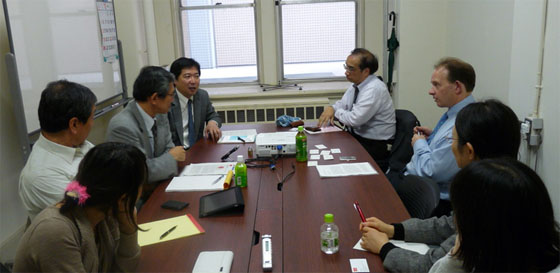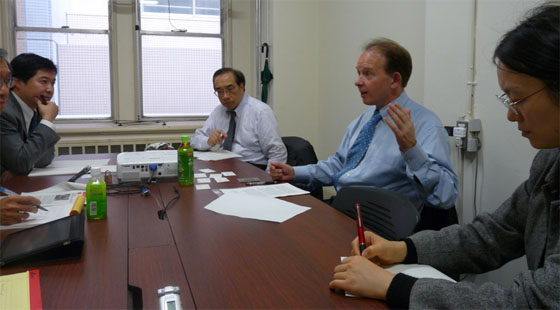Aging of Japan
Dec. 14, 2010
The 24th PARI Policy Discussion Report
We invited Mr. Henry Tricks, Tokyo bureau chief of "The Economist", which is an authoritative newspaper on international politics and business, to discuss Japan's economy, aging society and human resources.


Henry Tricks
Tokyo Bureau Chief, The Economist
Decline in the number of workforce and the shrinkage of Japan's economy
The decline of the working age from 15-64 years old has closely coincided with the end of Japan's economic boom : The peak of Japan's economic growth was in 1995, and the start of the working age population decline was in 1996. Basically, in over the next 40 years, we will see the mirror image of what's happened over the last 60 years. After the 2nd World War, the working age population grew from about 50 million to about 87 million, and by 2050 it will fall back to 50 million. This is more dramatic than anywhere else in the world.
The workforce is like the economy's engine room. This is people who work, who have kids, who spend money and save money. And economic growth is the sum of the growth of the labor force times the output. And so, if the numbers of the workforce go down, the output or the productivity has to rise faster. Let's explain this in terms of an elevator. For the last 50 years or so, as the working age population has grown, it's been like an elevator going up, and productivity has risen on top of that, which is why Japan has been able to enjoy a high growth rate. Now the elevator is going down, to stay up at this level, you have to run twice as hard. In that sense, it doesn't seem so surprising that Japan has not grown fast in the years since 1995. Demographics hasn't been used so often to explain that, but it should be.
People might ask - how can you argue that when Japan's economy from 2002 to 2008 had the longest period of economic growth in its postwar history? The answer : it can be explained by the exceptional circumstances where the yen was extremely cheap, which made it easy for Japan's economy / exporters to lead the economic growth. But it disguises the fact that the domestic market was not keeping pace and that the deflation continued to stay in the background. This problem is likely to get worse in the sense that the shrinking of the whole (not just the workforce) population is going to affect the demand side of the economy. Actually, more and more factories are being closed down, as they have outstripped the capacity of the companies. They may well be closed down for good, and might need to be even destroyed to reduce overcapacity, because those companies are never going to get the growth again that eventually absorbs the overcapacity. We need to realise that the deflation that Japan is now facing is a longer time danger than one that continues for only next few years or so.
What aging brings
There is clearly room to take advantage of an aging society, and it's not necessarily a weak society. Using new japanese technologies to very good effect, we might make Japan a healthcare center improving medical support for the elderly, and make it a tourist paradise. But there have been 2 problems that aging brings.
The 1st one is a public finance problem. In 2 years' time, the first of Japan's baby booms will hit 65 years old and start being able to collect state and corporate pensions. They basically are an 8 million strong bunch that will start hitting a straining pension system. And Japan already has a very high debt-to-GDP ratio and its public finance's already strained.
The 2nd one, which is more difficult to deal with and equally important, is that change becomes more difficult as elderly people are, by their nature, more risk-averse, more change-averse. The elderly in Japan carry a big share of the vote, forming a big voting block, so if they want to, they have the power to resist change. Whatsmore, as a group, they may benefit from deflation, because their savings increase in value as prices go down. So, there is a worry that as well as the aging being an opportunity, aging can be a cost, which is born by the young people.
What should Japan do about this? Firstly, we need to make use of Japan's human potential so that you compensate for the declining workforce. Secondly, Japan needs to increase productivity. Japan's businesses and its politicians should think harder about these.
Human resources problem in Japan
For cultural reasons and tax reasons, Japan doesn't employ enough women in senior roles. And many women do not go back to work after they get married or have children. Partly there's a tax reason, in the sense that it's not actually advantageous from a tax point of view for many women to go back, but that's also partly because they're not being offered good jobs once they go back to work, because the business community is not expecting them to come back in senior managerial roles. Also the pension system discourages the elderly people from work. At 65, if they were working, they get much lower pension, then they would do otherwise. So until it changes, its human potential can't be mined significantly .
To deal with this, we need to go right back to the education system. Firstly the education system should be encouraging people to have a spirit of entrepreneurship, so they can set up their own businesses. Also, universities and buninesses should work together to refine the hiring system so that young Japanese are encouraged to study abroad without thinking that this is going to affect their job prospects. At the same time, young people abroad should be encouraged to come and study in Japan in the knowledge that they can also get good jobs in Japanese companies if they've made investments in learning Japanese and learning Japanese cultures.
Women should be given full assurances by companies that they can come back to work after having children. Obviously, the businesses and the goverment need to work harder on childcare facilities, too. The retirement age should be raised and the seniority-based pay system should be scrapped for people so that elderly people can continue to work not at the expense of the young.
To boost productivity, you need businesses to compete more agressively with each other to engage in the process of creative destructions. Corporate Japan, in the demographic sense, looks quite like Japan's population : there are a lot of elderly businesses there. 20000 over 100 years old. Many have just kept alive because their bankers are giving them cheap credit and the they don't have any incentive to pull the plug on them. Actually, corporate culture is killing Japan, suffocating Japan. It's not encouraging a strong spirit of entrepreneurship. Companies are looking inwards still at their domestic market, even though that their domestic market is shrinking, rather than looking outward. Companies are making products that are great for the Japanese markets, but don't necessarily appeal to the new class of customers all across Asia and elsewhere. For example, Japan has great softwares, but they are custom-made and not scalable. So it's very difficult to scale up the business.
The good news is that, as far as corporate culture goes, change is being forced upon Japanese companies, and the big companies are really beginning to wake up, to the threats from South Korea, and from China. But the main point is that Japan now needs political leadership, because we need to work across cultures, across disciplines. The politicians need to make the ministries work across each other, encourage business and academia and whatever to work together, creating a story that can be said to the Japanese people, like "this is where we are heading over the next 10 years, we've got to do this, and this is not something that the Americans are telling us to do, this is something we have to do because our own society requires it of us". Doing that takes a lot of courage and a lot of determination. The question is : does Japan need to hit the wall first before it feels the determination to do that, or can it act in time before a crisis?



